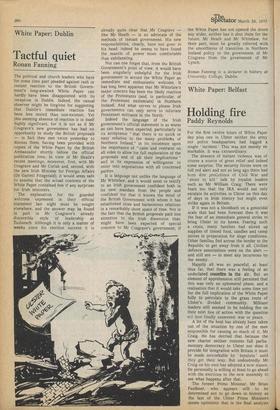White Paper: Dublin
Tactful quiet
Ronan Fanning
The political and church leaders who have for some time past pleaded against rash or instant reaction to the British Government's long-awaited White Paper can hardly have been disappointed with its reception in Dublin. Indeed, the casual observer might be forgiven for suggesting that Dublin's immediate reaction has been less muted than non-existent. Yet this seeming absence of reaction is in itself highly significant, for it is not as if Mr Cosgrave's new government has had no opportunity to study the British proposals — in fact they met twice yesterday to discuss them, having been provided with copies of the White Paper by the British Ambassador shortly before the official publication time. In view of Mr Heath's recent meetings, moreover, first, with Mr Cosgrave and Mr Corish and, second, with the new Irish Minister for Foreign Affairs (Dr Garrett Fitzgerald), it would seem safe to assume that the actual contents of the White Paper contained few if any surprises for Irish ministers.
The explanation for the guarded welcome expressed in their official statement last night must be sought elsewhere, and the answer may be found in part in Mr Cosgrave's already discernible style of leadership as Taoiseach. Although it is only a matter of weeks since his election success it is already quite clear that .Mr Cosgrave — like Mr Heath — is no advocate of the methods of instant government. His new responsibilities, clearly, have not gone to his head: indeed he seems to have found the mantle of power more comfortable than exhilarating.
Nor can one forget that, from the British Government's point of view, it would have been singularly unhelpful for the Irish government to accord the White Paper an immediate and enthusiastic welcome. It has long been apparent that Mr Whitelaw's major concern has been the likely reaction of the Protestants (and, in particular, of the Protestant extremists) in Northern Ireland. And what serves to please Irish governments can only serve to infuriate Protestant militants in the North.
Indeed the language of the Irish government's official statement is as warm as can have been expected, particularly in its acceptance "that there is no quick or easy solution to the many problems of Northern Ireland," in its insistence upon the importance of "calm and restraint on all sic'res to allow for full exploration of the proposals and of all their implications " and in its expression of willingness to enter into negotiations with all concerned parties.
It is language not unlike the language of Mr Whitelaw, and it would seem to testify to an Irish government confident both in its new mandate from the people and confident too that it knows the mind of the British Government with whom it has established close and harmonious relations in a remarkably short space of time. Nor is the fact that the British proposals paid less attention to the Irish dimension than might have been expected of special concern to Mr Cosgrave's government; if the White Paper has not opened the doors any wider, neither has it shut them for the future. Mr Heath and Mr Whitelaw, for their part, must be greatly relieved with the smoothness of transition in Northern Ireland policy to the government of Mr Cosgrave from the government of Mr Lynch.
Ronan Fanning is a lecturer in history at University College, Dublin


































 Previous page
Previous page